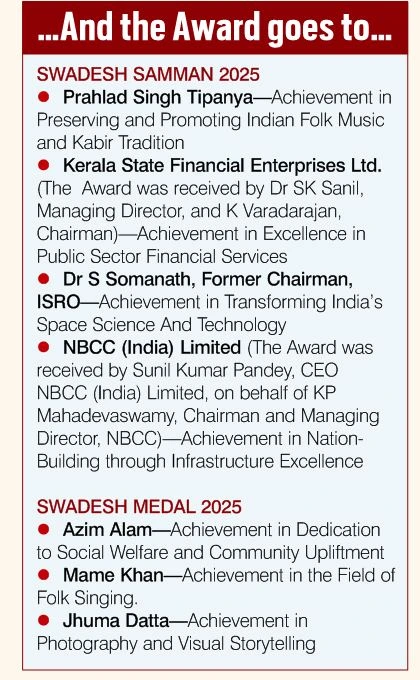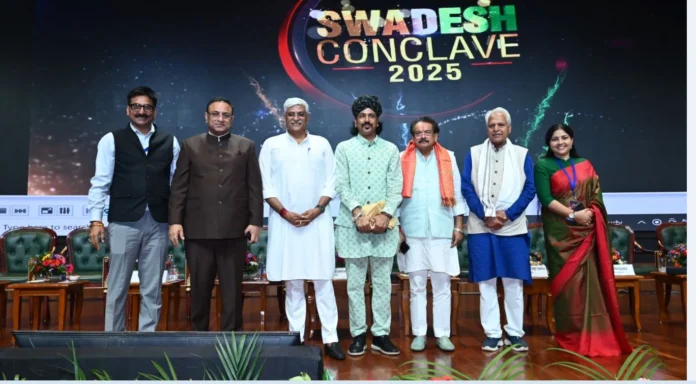By Sanjay Raman Sinha
The sixth edition of the Swadesh Conclave 2025 set off with a glittering start at the Bharat Mandapam, New Delhi. The Conclave underscored the linkages between new technology, especially AI, and its impact on the innovation, policy formation and equitable development. The deliberations also traced the arc of India’s global ascendancy all the while cautioning of ethical risks of unreined technological growth. The theme of this year’s Conclave was: “Transforming Bharat”.
Opening the Conclave, Rajshri Rai, Chairperson, Balaji Foundation, and MD, APN and India Legal, positioned Swadesh as a platform for national dialogue. “Swadesh Conclave is the platform to talk about national interests. Everyone must have the space to speak—true transformation begins with listening,” she said, quoting poet Faiz Ahmed Faiz. She said this year is the sixth edition of Swadesh Conclave. The Conclave was graced by central ministers, thought leaders and achievers from diverse fields.
Minister of State for Electronics and IT, Jitin Prasada, highlighted India’s landmark entry into semi-conductor manufacturing with the debut of a Made-in-India chip, calling it the dawn of a new technological era. “The age of oil is over—this is the era of the semiconductor chip. Chip is the new gold,” he said, noting that the government has established a Rs 10,000 crore fund to promote and regulate AI technologies. Referring indirectly to Donald Trump tariffs, Prasada said India will not hastily jump to sign any trade agreement under pressure.
Echoing this future-facing vision, Union Minister, Culture and Tourism, Gajendra Singh Shekhawat emphasized India’s rising stature on the global stage. “India is now known not just as the land of Gandhi, but also the land of Modi,” he said, urging citizens to adopt a Swadeshi spirit in embracing AI and nation-building.

Shekhawat stated India has been accorded a warm and respectful welcome at the Shanghai Cooperation Summit under Prime Minister Narendra Modi’s leadership. This was because of the progress the country has made in all fields, including technology, from the farm to the sports stadiums. Indians abroad are now proudly proclaiming themselves as being from this nation because of this government. It used to be the land of Gandhi, and now it is recognised as the land of Modi. The world is happy to mark World Yoga Day after the Prime Minister’s Modi’s efforts, Shekhawat said. He called on the people to join the mission to transform the nation by adopting Swadeshi.
SP Singh Baghel, Union Minister of State for Animal Husbandry, Fisheries and Panchayati Raj, asserted that India has led the world in multiple fields in ancient times, and one should be proud of it. India’s development is certain since it is going ahead to become one of the top three economies in the world, he said. Baghel expressed confidence in India’s path towards becoming one of the world’s top three economies, building on its historical leadership across disciplines.
Lok Sabha MP Manoj Tiwari shared in his inimitable style that it is very important to have patience in a person to advance in any field. He said he has come up in life after years of hard work, and with honest effort everything is possible. Tiwari told the gathering that they should not lose faith in politics even if they have lost faith in politicians, and invited young minds to join politics.
Retired JNU Economics Professor Arun Kumar said India needs high rates of growth over the next few years at 8.5 per cent to become a developed nation by 2047. Kumar said the income per capita in India should be $14,000, it is around $2,700 now. “We need high rates of growth at 8.5 per cent to grow demand and jobs and all of this has to be equitable.” Speaking on the economic structure, he said employment is a big issue. Women also face unemployment. Only six per cent people work in the organised sector, the rest in the unorganised sector, and it is not contributing to demand. This is why the disparity. If demand from unorganised sector goes up, even organised sector will grow fast. Currently, growth is dependent on 10 per cent of the organised sector. Decades ago, China focused on the rural areas and unorganised sector so that demand can be constant and drive growth.
“It has invested heavily in R&D and has reaped great growth. We need to do that also,” he emphasised.
Kerala State Financial Enterprises Ltd. (KSFE) Managing Director SK Sanil highlighted the importance of microfinance in empowering the poor, citing the success of Nobel Laureate Mohammad Yunus and Bangladesh’s Grameen Bank as a model for financial inclusion.
Sushma Rawat, former Director of ONGC and Chairperson of OTBCL, highlighted India’s transformative progress in oil exploration, from believing reserves existed only in Assam to discovering new sites. She emphasized believing in one’s capabilities, the power of technology, and continuous learning for growth and self-discovery.
The Swadesh Sammaan Awards were conferred on Dr S Somanath, former ISRO Chairman; KP Mahadevaswamy, Chairman and Managing Director of NBCC; KFSE Chairman K Varadarajan and MD SK Sanil; and folk singer and Padma Shri Prahlad Singh Tipanya. Rajasthani folk singer Mame Khan, social activist Azim Alam, and photographer Jhuma Dutta were conferred the Swadesh Medal.
Tipania and Mame Khan performed some songs from their repertoire for the audience, with the latter getting everyone to their feet.
Since its inception in 2020, Swadesh Conclave has evolved into a prominent forum shaping India’s discourse on technology, governance and cultural identity.


